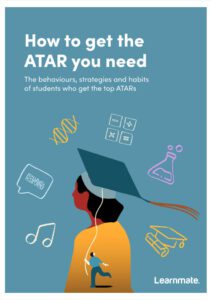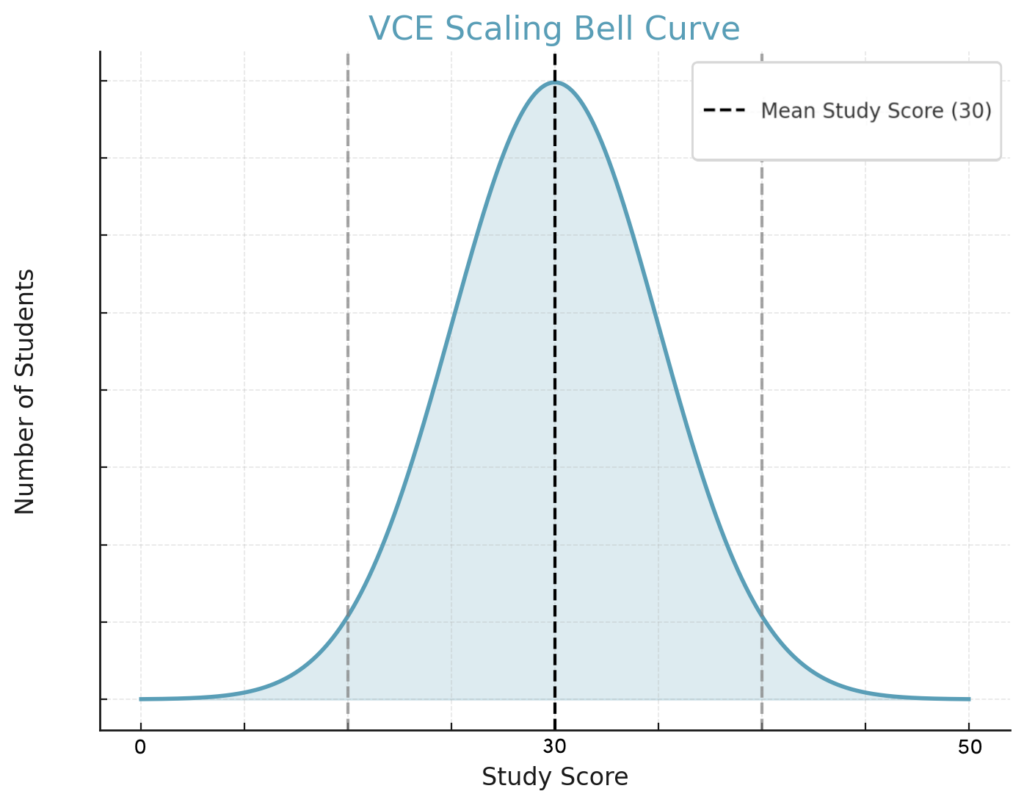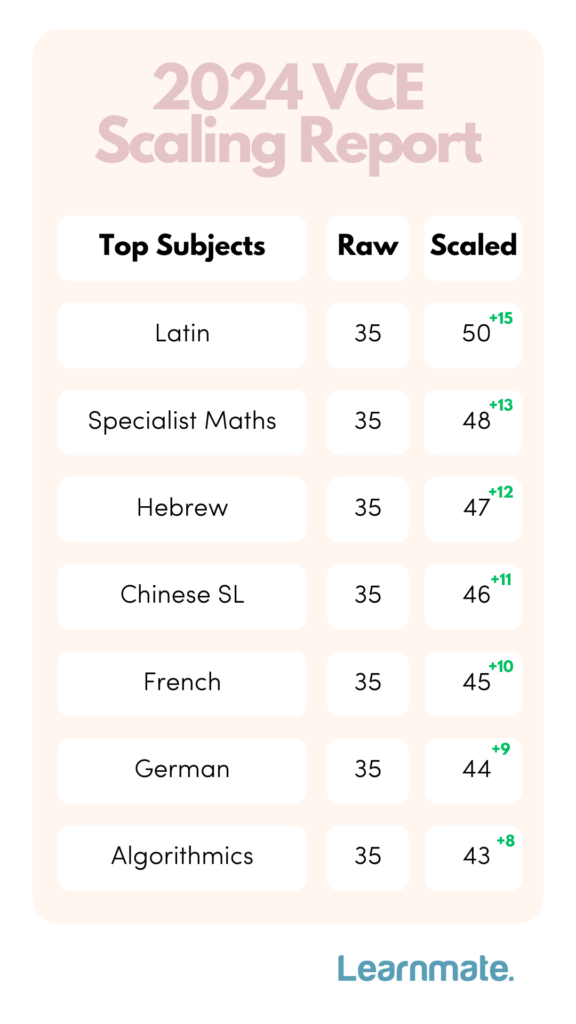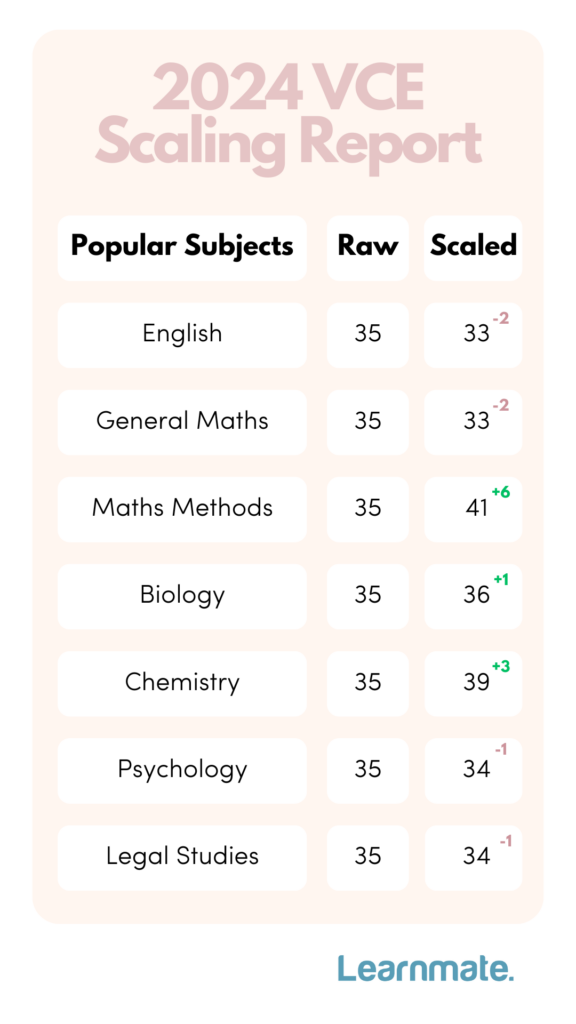As VCE students receive their results and ATARs, the VCAA’s Annual Scaling Report (2024) offers valuable insights into how different subjects impact final ATAR outcomes. Whether you're a current Year 11 or planning your VCE subject selection for next year, understanding how scaling works and which subjects scale up or down can be pivotal in maximising your ATAR in 2025. If you want to see how your predicted subject scores translate into an ATAR after reading this article, try our VCE ATAR Calculator.
Here’s an overview of the key takeaways from the 2024 Scaling Report and how you can use this data to plan your pathway.
What is Scaling and Why Does Scaling Exist?
Scaling is the process of adjusting a student's raw study scores to account for the relative difficulty and competitiveness of each VCE subject. This ensures a fair comparison across different subjects, allowing universities to assess student performance more accurately.
Without scaling, achieving a raw score of 40 in a challenging subject like Specialist Mathematics would reflect the same level of performance as a raw score of 40 in a less demanding subject—which wouldn’t accurately represent the effort and ability required, nor would it appropriately reward students for taking on harder subjects.
Several factors influence how a subject is scaled, including:
- The relative difficulty of the subject – Based on student performance trends and past data
- The strength of the competition – How well students in that subject performed overall
This process ensures that students are neither advantaged nor disadvantaged by their subject choices, providing a level playing field in ATAR calculations.
Understanding Your Raw Study Score
Your “raw” study score is a ranking of how well you performed in a specific subject compared to other students who took the same subject. The scale ranges from 0 to 50, with a mean of 30. The easiest way to visualise this is through a bell curve:
Students with a raw study score of 30 will sit in the centre of the bell curve, representing the average performance for the subject. Those who perform significantly above average may receive a study score closer to 50, while most students will find themselves in the 20-40 range, reflecting the majority cohort.
How Scaling Works
Once raw scores are standardised across the state, they are adjusted further to account for the relative difficulty and competitiveness of each subject. This ensures that obtaining the same study score in different subjects reflects equivalent levels of achievement.
By rewarding students who tackle more challenging or competitive subjects, scaling ensures that subject selection is fair and that no student is disadvantaged by their choice of subject. We will now have a look at what are Study Scores and some examples of how scaling was applied in 2024.
What is a Study Score and How is it Scaled?
Your raw study score is a ranking compared to other students who took the same subject, with a mean of 30. These raw scores are then adjusted to reflect subject difficulty and competitiveness, forming the scaled study score.
Key Examples from 2024:
- English: A raw score of 35 remained unchanged at 35.
- Mathematical Methods: A raw score of 35 scaled to 41.
- Health and Human Development: A raw score of 35 scaled slightly down to 31.
- Specialist Mathematics: A raw score of 35 scaled up to 48!
- Psychology: A raw score of 35 scaled down to 34.
Which VCE Subjects Scaled Up the Most in 2024?
Language and STEM subjects consistently rank among the highest-scaling subjects due to their challenging content and competitive cohorts. In 2024, standout subjects included:
- Latin: A raw score of 35 scaled up to 50, making it the highest-scaling subject of the year.
- Specialist Mathematics: A raw score of 35 scaled to 48.
- Hebrew: A raw score of 35 scaled to 47.
- Chinese Second Language (SL): A raw score of 35 scaled to 46.
- French: A raw score of 35 scaled to 45.
These results, as shown in the graphic below, reflect the significant effort and skill required to excel in these subjects. Students aiming for these high-scaling options should ensure they have a strong foundation and genuine interest in the subject matter to maximise their results.
Popular VCE Subjects: How Did They Scale in 2024?
Many students gravitate toward popular subjects like English (given an English subject remains mandatory), Psychology, and General Mathematics. While these subjects might not scale as highly as some STEM or language options, they remain critical choices due to their accessibility and alignment with student strengths.
Here’s how some of the most popular subjects fared in terms of scaling in 2024:
- English: A raw score of 35 scaled to 33 (-2).
- Psychology: A raw score of 35 scaled to 34 (-1).
- General Mathematics: A raw score of 35 scaled to 33 (-2).
- Mathematical Methods: A raw score of 35 scaled to 41 (+6).
- Chemistry: A raw score of 35 scaled to 39 (+3).
- Biology: A raw score of 35 scaled to 36 (+1).
- Legal Studies: A raw score of 35 scaled to 34 (-1).
The accompanying graphic below illustrates the raw and scaled scores for these popular subjects, making it easier to visualise how scaling impacted each one in 2024.
While some popular subjects scaled down slightly, they remain excellent choices for students who perform well in them. For instance, excelling in English or General Mathematics could still provide a strong foundation for achieving a competitive ATAR. These subjects are often favoured for their widespread availability and compatibility with a variety of tertiary pathways.
Should You Choose High-Scaling Subjects?

For most students, selecting subjects aligned with their strengths and interests leads to higher overall scores, regardless of scaling. According to Learnmate’s How to get the ATAR you need guide, students who choose subjects they enjoy and are skilled at are more likely to succeed in Year 12.
According to our research (you can read our guide by clicking the image of the guide or the link here), students who selected subjects that aligned with their interests and strengths were significantly more likely to achieve higher ATARs. This highlights the importance of not solely relying on scaling benefits but instead balancing personal aptitude with strategic subject selection.
Consider Balancing Scaling With Fit
Scaling shifts scores, but the right mix also matches how you learn: content-heavy vs practice-driven vs cause-and-effect vs folio. Use scaling to fine-tune—don’t let it pick your subjects. Model combos in the VCE ATAR Calculator and sense-check your mix.
Tips for Maximising Your ATAR in 2025
- Play to Your Strengths: Select subjects you enjoy and excel in. Scaling is secondary to achieving strong raw scores.
- Understand Subject Scaling: Review the annual scaling report to understand how your subjects may scale.
- Seek Expert Guidance: Consider working with a tutor to improve your understanding of challenging subjects. Tutors can help identify your weaknesses and develop strategies for improvement.
- Balance Your Workload: High-scaling subjects often demand more study time. Ensure you have a manageable workload to avoid burnout. It might be difficult to balance a full schedule of intense and high-scaling subjects.
- Stay Consistent: Regular practice and revision throughout the year will help you excel in your SACs and final exams.
Conclusion
Scaling is an essential part of the VCE system that helps ensure fairness and rewards effort in challenging subjects. By understanding how scaling works and choosing subjects that align with your strengths and interests, you can set yourself up for success in 2025.
Whether you aim to tackle high-scaling subjects or focus on performing your best in popular choices like Psychology or General Mathematics, the key is to stay dedicated and consistent. If you need extra support, tutors on Learnmate can help you reach your goals and maximise your ATAR potential.
Next steps: estimate your ATAR and plan your study
Turn today’s insights into action. You can model your subject mix with Learnmate's VCE ATAR Calculator (the most comprehensive subject selection available), or get an ATAR range based on your current or intended study routines with the Study Habits ATAR Calculator. Ready for support? Browse VCE tutors on Learnmate to build a week-by-week plan.
Results are indicative and depend on annual VTAC scaling.







